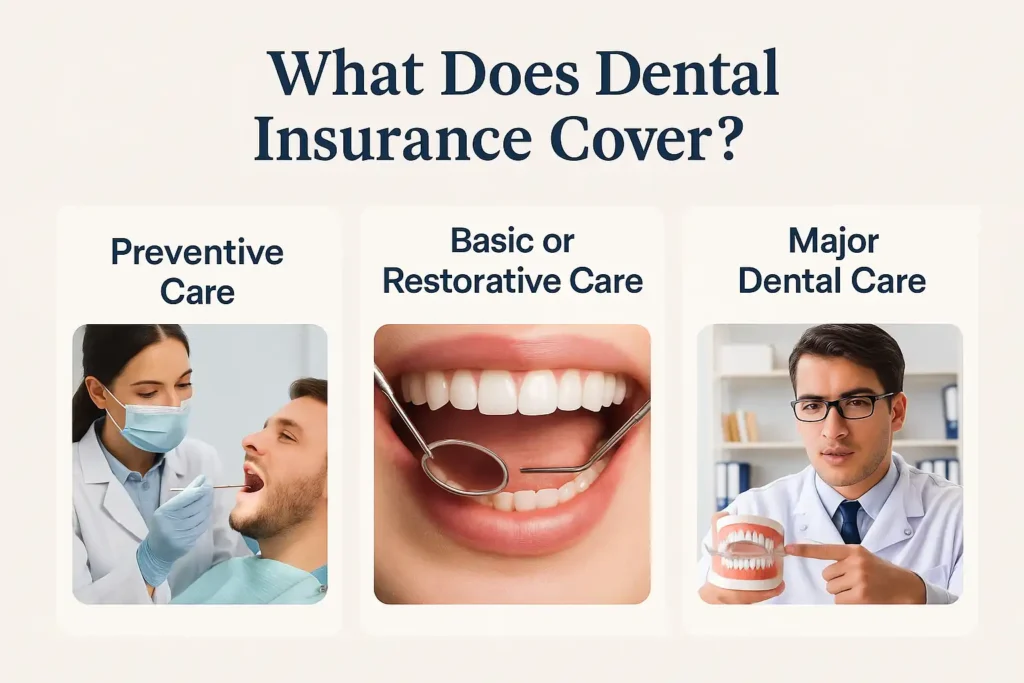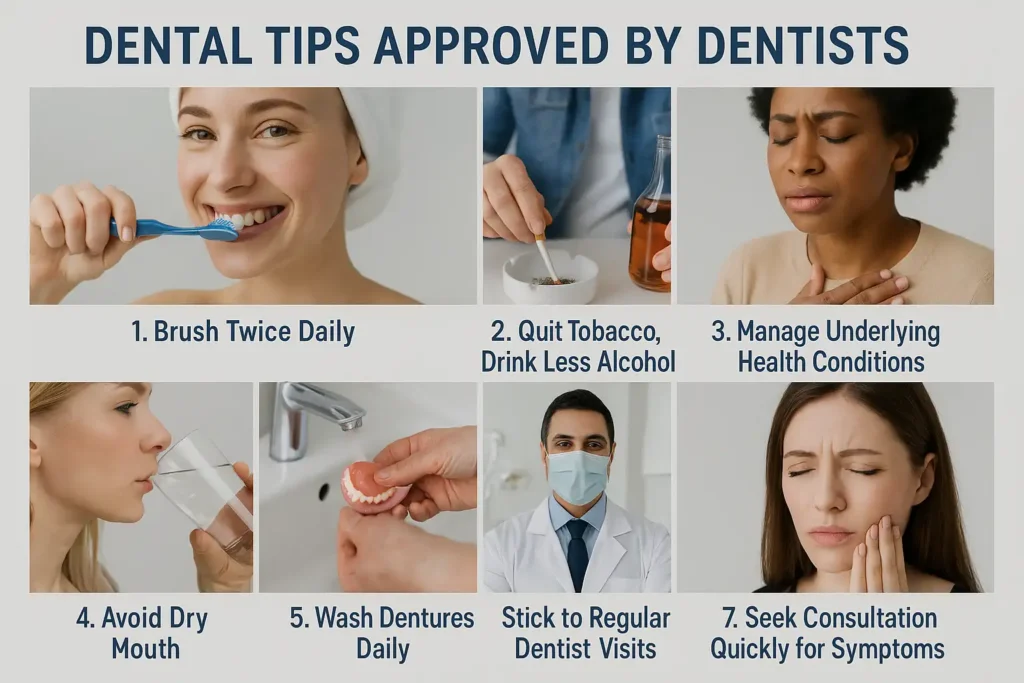Dental Care on $50 a Month: A Realistic Budget Guide
Dental insurance is crucial in helping people access necessary dental procedures and care. That is, without having the money to pay for it up front!
Millions around the globe, especially in the USA, depend on dental care insurance. This allows them to maintain their teeth and correct any dental issues. Considering the dental implant costs in NYC, dental healthcare helps you avoid high out-of-pocket expenses. That said, you’ll want to know if you can manage this on a $50 budget.
This blog covers the options, coverage, types of dental care, and tips to reduce your dentist bill.
How Much Will Dental Insurance Cost For a Single Person Per Month?
The monthly cost of dental insurance for a single person can vary greatly. It depends on several factors, such as:
1. Healthcare Insurance Provider
The cost of dental insurance varies based on the insurance provider. There are several insurance providers, giving American people more options when it comes to their teeth.
2. Plan Type
Many plans are available for people seeking dental care coverage. Picking one comes down to your requirements and budget. The three core categories for plan type are:
PPO Plans
These Preferred Provider Organization (PPO) plans are prevalent. Here, dentists will join the organization and accept a fee negotiation plan with insurers. Visiting dentists outside of this network results in higher out-of-pocket costs.
The greater administrative burden increases the cost, but it’s a flexible plan due to its extensive network.
HMO Plans
A health maintenance organization (HMO) plan is cheaper than PPO plans with low monthly or annual premiums. However, the limitations include being restricted to the HMO area and facing a potential out-of-pocket shortfall.
Indemnity Plans
These plans involve paying for the dental procedures at full cost and then filing a claim after. After processing, if the claim is approved, the insurance company will reimburse its share.
3. Plan Coverage
Most dental health insurers impose a plan coverage percentage based on the type of care. Generally, this coverage plan persists across plans and insurers:
- Preventive care: 100%
- Basic care: 80%
- Major dental care: 50%
High maximum plans that attract lower deductibles and extensive coverage (benefits) will also have higher premiums.
4. Age
Age is another factor that greatly influences your dental care costs. Older patients attract a higher fee than younger ones. This could be put down to greater risks and higher instances of complications.
5. Location
Your dental plan’s premium could be higher, depending on your location. Premiums within a state can even differ based on ZIP codes. This makes it worthwhile to compare dental healthcare costs before settling down in a state.
6. Deductibles & Co-Pay Terms
Plans highlighted by low copays and deductibles come with high monthly premiums. That said, plans with low monthly premiums have higher deductibles and copays.
Based on your budget, you can avail plans that start for as low as $20 a month.
What Does Dental Insurance Cover?
Based on the procedure and classification, dental insurance will offer different coverage. All dental procedures and appliances are divided into three main categories.

Preventive Care
These cover the procedures necessary to maintain oral health. It helps to prevent severe oral-borne diseases and detect any emerging concerns.
For effective preventive care, dentists suggest visiting your dentist twice a year. That’s a visit every six months to ensure any emerging condition doesn’t have time to manifest.
These preventive care visits will include:
- Dental cleanings to remove plaque buildup.
- Oral exams that examine the mouth for any problems.
- X-rays can detect and quickly catch dental issues.
- Biopsy tests to check for cancer.
Dental insurance usually offers 100% coverage for preventive care.
Basic or Restorative Care
All basic care practices will fix small dental issues before they develop into severe ones. They include dental procedures such as Composite Fillings, Sealants, and Simple Crowns.
They work to restore teeth’s health and extend longevity. Doing this allows people to retain oral function and maintain a smile.
Dental insurance covers 70% to 80% of costs for basic or restorative care.
Major Dental Care
Sometimes, restoring dental function requires complex surgical procedures, which are often costly.
These can include some of the following procedures:
- Root Canal – This is a procedure used to clean out infection from the tooth’s pulp. If left unchecked, the condition could spread to the bone that supports teeth.
- Dental Implants – These are artificial teeth that are supported with metal roots that are fixed into the jawbone.
- Periodontics – These procedures ensure care for the gum and bone structures that support and surround teeth.
Dental insurance will offer no more than 50% coverage for major dental care. This means patients will face a higher out-of-pocket bill!
Orthodontic Care
Orthodontics is about all the dental appliances that help teeth grow properly. It helps to correct teeth alignment issues in children and teenagers. It includes Wire/Ceramic Braces, Invisalign, and Retainers.
Dental insurance may cover these fully, but only for children.
Tips to Reduce Your Overall Dental Costs
If you want to reduce your dental care bill, caring for your teeth is essential. Healthy teeth need less corrective or dental surgery.
Follow Dentist-Recommended Oral Hygiene Practices
Maintaining a healthy approach to dental hygiene is important. This includes brushing twice a day and flossing once a day.
Using mouthwash or rinsing after meals may also be necessary to dislodge food particles. Using the appropriate toothbrush and toothpaste is also helpful for maintaining oral hygiene.
Don’t Miss Dental Checkups!
This could be a costly mistake! A dental checkup is due every six months, and this is often for a reason.
Missing out on a single checkup could give an issue ample time to develop into something severe. This could result in irreversible effects and leave you with a high dental bill.
Watch What You Eat
People who eat a wide variety of poor foods are at risk. Steer clear of sticky and sugary foods that can cause tooth decay and other damage.
Limiting other harmful beverages, such as tea and coffee, can work to reduce staining. Fruit juice can also be dangerous as it contains sugar and is acidic.
Plan Your Dental Requirements
If you require significant dental work, ensure you spread it over time. This is necessary since some dental insurance plans have a waiting list. Here, patients cannot receive coverage until they wait out a pre-set duration. This could be as long as 6 to 12 months.
What are Some Dental Care Tips Approved by Dentists?
Adults can develop oral health issues at any stage of their lives. The most concerning ones are gum disease, tooth loss, oral cancers, and accelerated tooth decay after age 60. To help with these issues, here are some dentist-approved tips:

1. Brush Twice Daily
Brushing twice a day is a non-negotiable dental care tip that every dentist will back. Along with brushing, dentists will emphasize the importance of flossing at least once a day. This helps dislodge food particles wedged in spaces where toothbrushes can’t reach.
2. Quit Tobacco, Drink Less Alcohol
Tobacco and smoke are carcinogenic agents, so increased exposure to them can increase vulnerability to developing cancer. Quitting smoking also creates an opportunity to spare your teeth from tobacco-related staining and decay.
Excessive alcohol consumption is another habit that can accelerate ill dental health. Limiting your alcohol intake can greatly decrease your chances of getting head or neck cancer.
3. Manage Underlying Health Conditions
Underlying health conditions can trigger dental health decline. Medications to treat such conditions may impact oral health. The best option is to manage your condition and visit your dentist regularly for the medicine-induced effects.
4. Avoid Dry Mouth
Dry mouth can occur due to dehydration, illness, medication, vitamin/hormone deficiency, or substance abuse. Severe dry mouth is also medically known as xerostomia. It can be resolved using an over-the-counter saliva aid and resolving the deficiency.
5. Wash Dentures Daily
Dentures for seniors must be cleaned daily to prevent the development of a fungal infection. Most dentists suggest keeping them out all night for cleaning.
6. Stick to Regular Dentist Visits
It’s suggested that people should visit a dentist every six months. Regardless of whether they are facing issues or not, this visit is mandatory. This gives your dentist enough time and opportunities to catch any new developments.
7. Seek Consultation Quickly for Symptoms
If symptoms develop between your yearly visits, you must address them quickly. This will require making a special trip to the dentist. Delaying the visit or avoiding it altogether can worsen the issue.
How Many Types of Dental Care are There?
Although some recognize 12 areas of dental care, they can be narrowed down to 7 based on specialties.
1. General Dentist
As the name suggests, these are the primary dental health providers. They’re also the most easily accessible dentists.
A general dentist takes care of checkups, oral exams, and teeth and gum assessments. They can treat simple issues such as tooth decay with fillings, root canals, or dental crowns.
2. Pedodontist or Pediatric Dentist
These dentists specialize in providing dental care to children. Catering to children, they offer a wide range of services that are gentle enough for toddlers, children, and teenagers.
Patients who turn 18 years old don’t qualify to receive dental attention from a pedodontist. They will be required to visit a general dentist or specialist based on the issue.
3. Periodontist or Gum Specialist
A vital part of the dental system are periodontists who specialize in treating gum-related conditions. Swelling, bleeding, or recession of the gums are all warning signs of gum disease.
These gum experts offer treatment for gum disease and can do minor gum-related surgeries. People planning to get dental implants are referred to a periodontist for specialist care.
Do you want to know if dental implants last longer than other treatments? Find out in our blog: Dental Implant Care: How to Make Your Investment Last.
4. Endodontist or Root Canal Specialist
These specialized dentists are responsible for treating conditions associated with the dental pulp. Endodontists are vital dental care providers since the pulp contains nerves and blood vessels.
When tooth decay progresses to the pulp, a root canal may be the only way to save a tooth. This procedure involves cleaning out the infected pulp and placing a crown over the tooth.
5. Oral Pathologist or Oral Surgeon
An oral pathologist and an oral surgeon aren’t the same. But they work closely together to identify, diagnose, and fix oral diseases and their effects.
Conditions that require attention from oral surgeons and pathologists are:
- Impacted teeth
- Oral reconstruction
- Cancers (mouth, head, neck)
An oral surgeon may also work closely with ear, nose, and throat specialists to treat facial trauma and sleep apnea.
Orthodontist
An orthodontist is a specialist who deals with jaw or tooth misalignment and crooked teeth. They can help fix bite issues resulting from overbite, underbite, and open bite defects. The most effective treatments for these conditions are usually dental appliances. They include Braces, Invisalign, and Retainers that can correct the position of teeth. Orthodontists can also offer jaw repositioning appliances to correct jaw alignment issues.
Prosthodontist
Dental prosthetics are necessary for seniors who have lost several teeth. They also find use by people who have had serious accidents and have lost many teeth. Their work is more focused on restoration than prevention. Dental restoration is mostly necessary due to extensive tooth decay. Loss of teeth, staining, or damage to teeth are other instances in which a prosthodontist can help. These restorative experts deliver restorative requirements through dental crowns and bridges, dentures, porcelain veneers, and implants.
What are Some Dental Care Toothpaste Options?
To help keep serious dental issues at bay, people can select the appropriate toothpaste. The following options can work as temporary solutions for some cosmetic dentistry procedures and preventive care.
Sensodyne Toothpaste
The Sensodyne range of toothpastes is famous for its ability to soothe the gums or provide relief to exposed tooth roots.
Arm & Hammer Toothpaste
This brand features an extreme whitening variant that helps to whiten teeth without creating a dramatic change.
Crest Toothpaste
Crest toothpaste is for its ability to deliver all-around oral care. This can be effective against the regular wear, tear, and natural deterioration of teeth.
Tom’s of Maine Toothpaste
Their natural anticavity toothpaste features a safe amount of fluoride that works to discourage cavities.
Paradontax Toothpaste
This brand’s complete action toothpaste will protect against gum and root issues, such as receding gums.
Is Dental Care Insurance Worth it?
When looking at the coverage and the actual monthly premium cost, it’s natural to question its worth.
The majority of the public finds dental healthcare worthwhile. It allows everyone to address dental issues without having the full cash amount.
This is a blessing, since some dental procedures can cost thousands without adding any complications.
That’s why dentists advise patients to avail healthcare insurance. Doing it years in advance can help you later on when you need treatment. Spreading dental work across a wider time span can reduce the out-of-pocket expense.
It helps to spread your coverage and increase the chances of getting the full designated coverage amount.
So yes, it makes dental care insurance very useful. This is especially true for people with poor dental health.
Why Should You Speak to Your Dentist About Dental Care or Insurance?
Many people fail to consult their dentist before getting dental care insurance. This is a mistake, as most dentists can advise their patients on the matter. It would be more helpful as they are aware of the patient’s dental needs and history.
The dentist can even provide special discounts based on certain plans. This highlights why your dentist should be the first place to consider insurance advice.
Conclusion
Paying $50 or less for dental care is not all that bad. Most plans come with coverage of 100%, 80%, and 50% for preventive, basic, and major dental care.
Even a 50% coverage is a reprieve considering how much certain procedures can cost. This part coverage can help people get the dental assistance they need when they need it. Immediate access to necessary care helps to prevent certain issues from becoming more threatening.
FAQs
1. How can a person afford dental implants?
Most people can afford dental implants by saving up for them and by availing dental healthcare insurance.
2. What are three common dental problems?
The three most common dental problems are tooth decay, tooth loss, and gum disease.
3. What does dental insurance actually cover?
Dental insurance does cover all dental procedures and care. However, the percentage covered does vary depending on the necessity of the care.
4. What is the cheapest fix for bad teeth?
While there isn’t exactly a cheap fix for bad teeth, there is a temporary fix! Dentures can be a temporary replacement for dental implants. Temporary whitening or cleaning can cover for more complicated procedures.
5. Is it better to pay cash or use dental insurance?
Paying out of pocket would lead to high expenses. Although insurance wouldn’t cover all the costs, it could potentially cover a large chunk of them. That said, dental healthcare is the better option if you are struggling to keep up with treatment costs.

Dr. Alexander Heifitz (Author)
Dr. Alexander Heifitz is the founder of 65 Broadway Dental in NYC, where he combines advanced dental expertise with a patient-first approach. He specializes in cosmetic and restorative treatments such as dental implants, veneers, Invisalign, and smile makeovers, helping New Yorkers achieve both oral health and confidence.
Booking An Appointment
Looking for a reliable dentist in Downtown NYC? Whether you need a routine cleaning, urgent care, or a full smile transformation — we’ve got you covered. We accept most PPO insurance plans and offer flexible scheduling.
+1 (212) 430-3888
Call for appointment
Walk-ins Welcome / Same-Day Appointments Available

